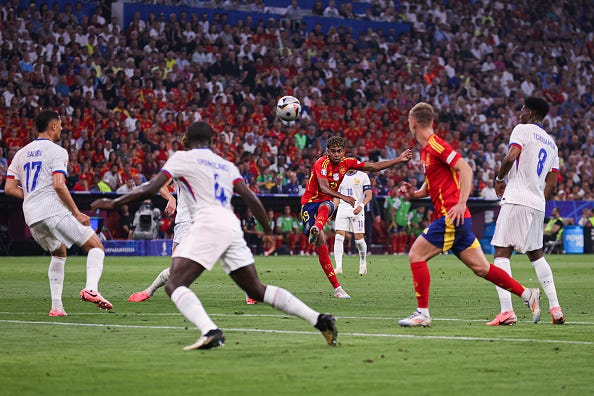How Spain became kings of Europe - the inside story
Nobody was closer to the winners of Euro 2024 than Graham Hunter - here's what they told him about their road to glory
Allianz Arena, Munich. Semi-final, Euro 2024. July 9
Euro 2024 Semi-Final
Spain 2 France 1

Pre-match, Nacho tells Marca: “One of our defining characteristics is that we play bravely. We always play to win – we attack, we try to open up spaces in a match. Some teams might want to be more cautious, but this feeling of joy, the idea of going for a match are fundamental to us.”
Last time Spain played France in Germany I was there. 1-0 up, 3-1 down. Out of World Cup 2006. Judged to have been ‘mugged’ by an older, more street-smart team. This time Les Bleus are stuffed by a 16-year-old. Lamine Yamal is eerily composed, smart and football intelligent for a kid. Talented? Mazy? Sublime fun to watch? All these, yes, but his composure, his vision, his judgement – just jaw-dropping.
Already the youngest footballer to play in any Euro, the youngest to assist, he inevitably becomes the youngest to score in one, too. This goal, brilliant as it was, was actually a direct replica of the one he scored, versus France, the previous summer in the Under-17 Euro semi-final.
At the other end of the age spectrum, Jesús Navas puts in a hell of a shift. In place of the suspended Carvajal, he is at fault for France’s goal, but not too many know how badly he has been suffering from muscle pain which often stopped him training at the training ground Spain hired from SV Aasen (about four minutes’ drive from their golf hotel).
However, everyone, including France, know he is almost 39 years old. Still, they can’t do enough harm down his touchline, nor can they prevent his role in Olmo’s winner.
Tens of thousands of Germans bought semi-final tickets in anticipation of beating Spain in the previous round. They boo Cucurella relentlessly. He thinks it’s a lark.
On the theme of Spain’s family atmosphere, it’s indicative that La Roja are, by far, the team which has used the most players during the tournament. Trusted them. Kept them engaged. Found ways to help them contribute. Of the 26 footballers in their squad, only third-choice keeper Alex Ramiro hasn’t had a single minute and only three others (Álex Baena, Fermín López and Ayoze Pérez) haven’t started.
By comparison, at the semi-final stage, 10 in Didier Deschamps’ squad hadn’t started in an XI, 12 in England’s squad and 11 for the Dutch. Spain used their resources, De la Fuente inspired his men, and his bench players constantly came up with solutions. Which is a euphemism for goals, assists, match-winning performances – Olmo, Merino, Ferran Torres, David Raya (superb against Albania), Navas, Dani Vivian (especially against France), Ayoze, Martín Zubimendi, Mikel Oyarzabal. All of them showed up, big time. De la Fuente said at the top of the tournament that the ‘human element’ was most important and that ‘group management’ was key to winning a tournament; that transmitting confidence and enthusiasm was what he and his staff were dedicated to, and they gave us the whole enchilada.
Post-victory, De la Fuente gives me my favourite quote of the tournament. On the subject of his teenage prodigy, he says: “Lamine is doing things which give hints that he might be a great, not just of football but of sport. But we need to remain prudent. He has to keep his feet on the ground, and we have to help him progress and develop in the best way possible. Which is by keeping him level-headed and doing what they did in Ancient Rome when they told Julius Caesar: ‘Remember, you are mortal!’”
The Final: Olympic Stadium, Berlin. July 14, 2024
Spain 2 England 1
Back where it began. Against the rival that Spain should have faced at Wembley in summer 2021, having outplayed Italy in the semi-final but lost on penalties.
Before the game, The Athletic’s Colin Millar posted:
And I had unshakeable faith that La Roja would win this. I thought De la Fuente’s team didn’t look all that clever in the first half and, like almost any sentient being (except for De la Fuente) I thought it might be a disadvantage that Rodri needed to come off at half-time. Spain’s coach later told me that while he thinks Rodri is by far the best organising midfielder in the world and just demands to be awarded the next Ballon d’Or, Zubimendi is the second-best player in the world in Rodri’s position.
I’m not sure that I’ve ever heard a louder support than England’s. Maybe time dims the memory, but I thought that they made a non-stop, startling level of noise. The side which used the ball better, which pressed better, which used less energy chasing after things, won. Those themes emerged across the full 90+ minutes because, during the first half, England pressed well, looked more commanding and seemed to understand how to unsettle Spain.
But Spain played with bravery, and they took risks. Carvajal’s ‘Modrić’ flick with the outside of his right boot was a huge creative risk – but he cut Jude Bellingham and Luke Shaw out of the way when he found Lamine like that, and the ball was in the winger’s path so that he was instantly looking across the path of his dribble and set-up for Nico Williams to score.
Olmo, Morata and Lamine (twice) should really have scored and closed the final off. Williams nearly did.
Cole Palmer’s goal was sublime – why on earth wasn’t he a central part of England’s campaign? Inexplicable.
Then, the winner. Look at the creative risk, the skill, the instincts.
England are too tired to press the ball being played out by Laporte. Ruíz and Olmo are both free between England’s lines. Oyarzabal is aware that he can feed Cucurella (hi Gary) on the volley, and then turns and sprints for the 1-2 to make it 2-1.
It is the prototype goal to illustrate Spain’s ideas – create the free man; find him quickly. That free player must have a prepared vision of what should come next, players in motion all around him, ultra-technique helps the speed – goal! Or: Gol! Gol! Gol! Gol! as it was roared on Spanish television and radio commentaries.
When Spain won, Williams ran with his medal to find his parents so that he could award it to his mum because, to him, she was the ‘true champion’.
In the depths of that strange, sometimes eerie stadium, I was charged with doing the uefa.com interview with Morata, whose wife and four kids had been robbed by armed men while in their Italian holiday home during the tournament. And with talking to the two scorers. I’m sure you can still see the interviews on the Uefa EURO 24 app.
Oyarzabal who, not too long ago, missed over a year thanks to ACL damage, admitted: “It hits you that you should enjoy even more the mere fact of being able to be here among the 26-man squad. You just embrace that joy, you accept whatever may come, sometimes playing and sometimes not, and that’s been my mentality for the last month and a half.”
Morata told me for uefa.com: “In this Euro, I’ve had to don my work uniform. I’ve chased after Jude Bellingham, after Bukayo Saka, the other day I even chased after Kylian Mbappé; I defended against Ousmane Dembélé. The truth is I knew that I was going to have to put a shift in, and in that regard I’m generous, so that my team-mates can also have more space - I’m proud of that.”

Last phrase to Williams. “In the end, the 40 or 45 days that we spent together in this squad paid off. I think that we understand each other perfectly, we all share an incredible friendship. We are like a family, and in the end when you get along with your team-mates very well, it shows on the pitch.”
Happiness, harmony, heroes. This was one of those sublime moments when the tournament was won by the best team – by far – and even in a month when so many elite footballers looked tired and so many coaches opted for jaded ideas, Spain were brilliant. Brilliant to watch. Brilliant to follow. And brilliant together. Viva La Roja.






